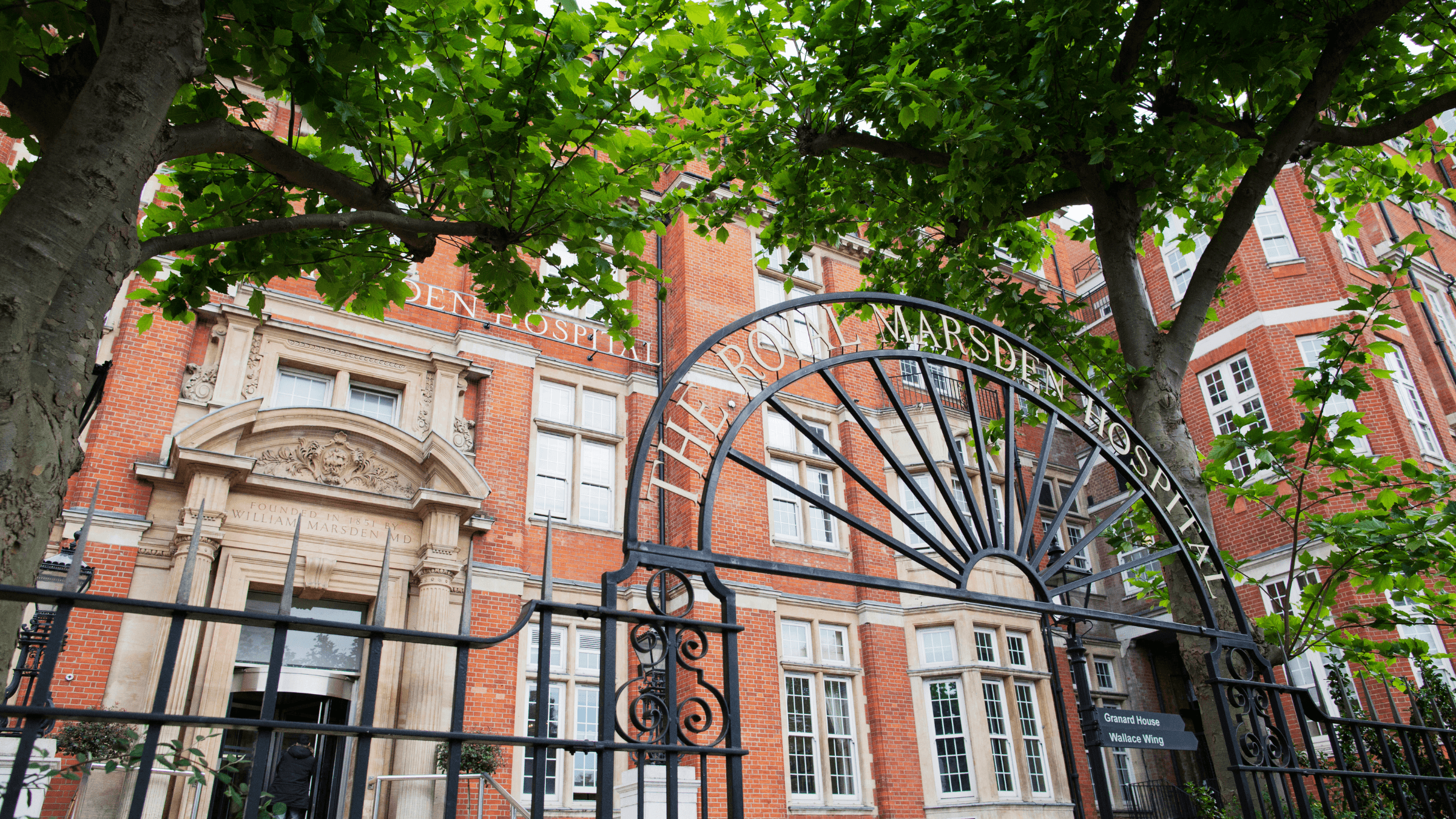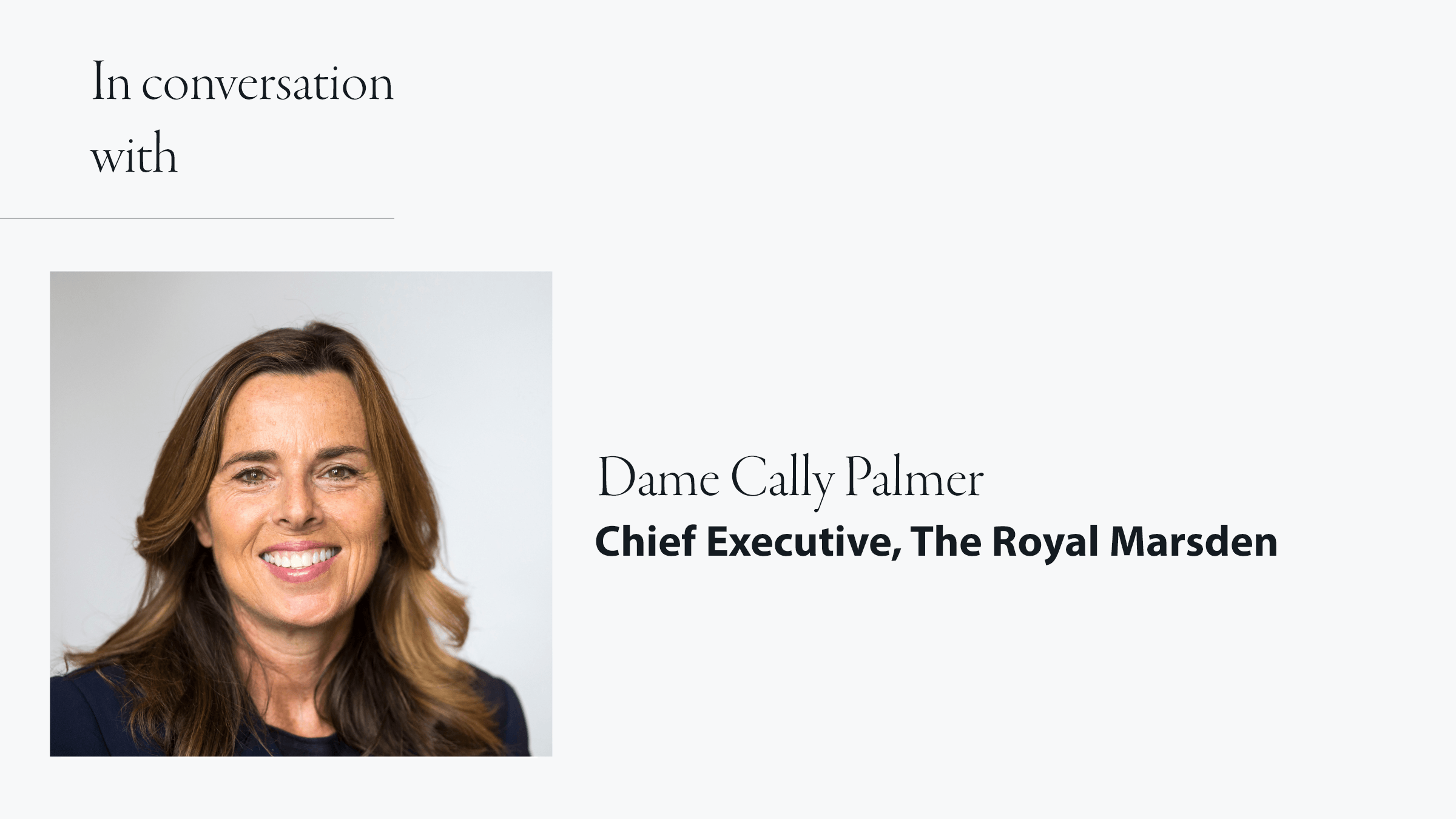Few chief executives spend more than a decade in any individual role: in the FTSE 100, the average tenure is six years, and CEOs in the S&P 500 rarely lead for longer than seven. Dame Cally Palmer, Chief Executive of The Royal Marsden, is an exception to this rule. Now one of the top-five cancer centres in the world for research impact, The Marsden’s success makes clear that there are lessons we can all learn from her leadership.
Since 1998, Palmer has steered the pioneering cancer care hospital through multiple waves of strategic refocusing and modernisation. In her more than two decades at the helm, she has deftly balanced transformation with perpetuating the organisation’s long-standing heritage of excellence and innovation. Under her leadership, The Royal Marsden has expanded its footprint and its reach, opening a drug development unit, and establishing both a private care practice and RM Partners, the NHS cancer alliance which looks to achieve world-class cancer outcomes for the whole population of West London. Critically, alongside this expansion, Palmer has knitted the different strands of The Marsden’s work together more tightly, ensuring a close partnership between the hospital and its academic partner, The Institute of Cancer Research.
Talking to Palmer last month, we discussed how The Marsden has evolved in the past twenty-five years, the game-changing impact of a collaborative culture, and what her outstanding leadership – my words not hers! – can tell us about CEO excellence, in healthcare and beyond.
“I’m an enabler first and foremost,” she said when we caught up. “I’m not a clinician or a researcher, but I’m here to pinpoint the exact direction of travel, and to ensure that the best people have what they need to succeed.”
It is this clarity of vision that has defined Palmer’s time as CEO, underpinning years of decisions around culture, structure, people, operations and commercial approach. “When I took the role, I saw exactly what the hospital should be about,” she recalled. “The thing about a cancer centre is that you’re only as good as your last discovery, so I was laser-focused on making sure The Marsden was at the forefront of global cancer research, innovation and impact.”
“The thing about a cancer centre is that you’re only as good as your last discovery, so I was laser-focused on making sure The Marsden was at the forefront of global cancer research, innovation and impact.”
To ensure The Royal Marsden could compete globally and make an internationally-recognised impact on treatment and research, Palmer led significant modernisation – not only refreshing teams and updating infrastructure but fundamentally reimagining the structure of the organisation. “There was a complete divide between The Institute of Cancer Research and The Marsden,” she explained, “there was no integrated strategy, and no recognition of the need to work as a team.” Working together with the CEO of The Institute of Cancer Research, Palmer has strategically aligned the two organisations, building a bench-to-bedside model that enables and applies the groundbreaking scientific work taking place.
This collaborative approach has propelled The Royal Marsden to the leading edge of scientific discovery. The institution hosts around 800 clinical trials at any one time (a huge number when compared with the total of c.6,300 that took place in the UK last year), and has evolved into a vital centre of excellence for UK life sciences. Just last week, for example, The Marsden made headlines thanks to a new AI tool that will help clinicians grade the severity of rare cancers, potentially improving treatment for thousands of patients every year.
Alongside long-term strategic decisions, Palmer is clear on the CEO’s role as a driver of culture. Like many new chief executives, refreshing the internal culture at The Marsden was high on her initial list of priorities. “When I arrived, the culture was very individualistic,” she recalled. “Executive team meetings could be challenging, and there was a real ‘divide-and-rule’ atmosphere. We lacked collaboration between the medics, the nurses, our research experts, and our hospital team. It didn’t feel professional, and I was very clear from the outset that this had to change.”
Now, the impact of Palmer’s leadership can be felt right across the healthcare sector. In her time as CEO, she has identified and developed best-in-class leaders who have themselves gone on to helm some of the world’s most impactful organisations. If one measure of a CEO’s success is how many future leaders they have nurtured, Palmer can already point to a powerful contribution. Dr Liz Bishop worked alongside her as Deputy CEO and COO at The Marsden, before being appointed to lead The Clatterbridge Cancer Centre as CEO. David Probert’s time in operational leadership at The Royal Marsden preceded his success as CEO at UCLH, and Professor Shelley Dolan spent nearly a decade as Chief Nurse / Deputy CEO at The Marsden, before becoming CEO of the The Royal Melbourne Hospital.
Having worked with her on multiple senior appointments, I was keen to hear about Palmer’s approach to spotting, appointing and developing talent. “There are two main considerations,” she told me. “Firstly, it’s about finding the right blend of people for your team – complementary skillsets as well as a good mix of personalities and attitudes. You have to be careful not to just hire in your own image.
“It’s about finding the right blend of people for your team – complementary skillsets as well as a good mix of personalities and attitudes. You have to be careful not to just hire in your own image.”
“Secondly, I always appoint for potential. Better to hire someone who requires a bit of development but is clearly really special, than to bring in someone just because of their solid track record. This is especially important at The Marsden. We’re not a normal hospital, we play a global role in research impact and we need people who are a little bit different, a little bit exciting.”
Away from transforming the organisation’s leadership, Palmer has steered The Royal Marsden through a period of immense change and ambition. The Marsden has established the largest private care service within an NHS Hospital, hiring a commercial leader and recently winning the LaingBuisson “Best Private Hospital” award (a recognition aimed at the independent healthcare sector) twice. The unit enables private patients to access The Marsden’s research-active clinicians and specialist nursing teams while private income supports the exemplary quality of care, equipment, and services The Marsden makes available to NHS patients. There have also been multiple new buildings, each with an extremely high degree of operational complexity.
Excitingly, the hospital has just finalised a £100m digitisation programme. It was interesting, in the context of The Marsden’s focus on innovation, to hear Palmer reflect on The Marsden’s highly considered strategy for digital transformation: “I always knew that bringing in a new digital health record would be an immensely complex job,” Palmer told me. “And so we deliberately didn’t want to be first. I thought: let’s learn from the first movers. We chose not to be at the forefront of this particular innovation.”
Instead, The Marsden worked closely with other sites that had already moved to an electronic patient record – notably Great Ormond Street – to ensure it was as well-prepared as possible, and managed the implementation in a way that worked well for the hospital’s distinctive services. Subsequently, The Marsden has been sharing those learnings with others now embarking on their own digital transformations.
Throughout her CEO career, Palmer has demonstrated a keen ability to balance acting within a carefully defined framework with being nimble enough to seize opportunities at the right time. “A good leader needs to be fleet of foot,” she reflected. “You need to be crystal clear on priorities, but have the flex to move quickly if you see an opportunity, or something that needs doing.”
“You need to be crystal clear on priorities, but have the flex to move quickly if you see an opportunity, or something that needs doing.”
It is at these inflexion points that a self-assured leadership style is critical. “When I first started, I don’t think I realised how important it was to act with conviction,” said Palmer. “You have to seize opportunities, and demonstrate to your team that your decision was part of a broader framework. You have to take risks, and make sure you’ve got the systems in place to deliver. I think our success can be put down to conviction, a good team, good judgement – and a bit of luck.”
For the 60,000 patients treated at The Marsden every year, and their loved ones, it may be that the greatest piece of luck is Palmer being at the helm of the organisation. A first-time CEO when she was appointed, her conviction, insights and priorities have shaped The Marsden to the world-class organisation it is today: a jewel in the crown for UK healthcare and life sciences; an employer of some of the best clinicians, scientists and managers in the world; and the home to the consistently outstanding-rated service that so many need. Thanks in part to its exemplary leadership, The Marsden is one of the UK’s gems – long may we treasure it.











